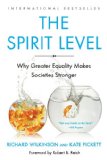Summary | Excerpt | Reviews | Beyond the Book | Readalikes | Genres & Themes | Author Bio
Why More Equal Societies Almost Always Do Better

Critics' Opinion:
Readers' Opinion:
First Published:
Dec 2009, 352 pages
Paperback:
Apr 2011, 352 pages
 Book Reviewed by:
Book Reviewed by:
Jo Perry
Buy This Book
It is because our long evolution as social animals has sensitized us so acutely to the quality of social relations that studies now find social status and friendship are such powerful psychosocial protectors of health and wellbeing, while inequality and social exclusion are so damaging.
The powerful effects of inequality are also transmitted from parents to children. Different parenting styles can be understood as expressions of a social structure in which an adult’s lifelong experience of adversity, inequality and low status, is passed on to children and serves to prepare them for the kind of social reality they are likely to have to cope with. Growing up in a society in which you must fight for what you can get and cannot trust others, requires a very different emotional and cognitive development from what would be needed if you were growing up in a world in which you depended on cooperation and mutuality, in which your security depended on the goodness of your relations with others.
People often assume that the benefits of greater equality are confined to the poor. Not so. The differences in the performance of more and less equal societies is so large because the vast majority of the population benefit from greater equality. Our research shows that even the well-off, well-educated, middle classes benefit from living in more equal societies. Whilst the benefits of greater equality are largest lower down the social ladder, even at the top of society people live longer and do better in more equal societies.
The reason why the benefits of greater equality are not confined to the poor is, of course, because we are all caught up in status competition. We all worry about keeping up appearances, about what others think of us, and how we are judged.
So whatever the political and moral arguments, the evidence shows that inequality damages us all and imposes huge costs on our societies, as they struggle to cope with the fall out.
But what about the transition to sustainability? Greater equality contributes to the ability of societies to reduce carbon emissions in two different, but important, ways. First, coping with climate change is a major test of people’s willingness to accept policies for the sake of the common good – for humanity at large. Greater equality is a crucial determinant of how societies measure up to this test. Because people in more equal societies feel they can trust others, are more involved in community life, and less out for themselves, those societies are also able to be more public spirited: they spend more on overseas development aid; they recycle a larger proportion of waste materials; they score higher on the Global Peace Index, and their business leaders think it more important that their governments abide by international environmental agreements.
One of the most important obstacles to reducing carbon emissions is consumerism. Here too greater equality has an important role to play. The pressure to consume is driven substantially by status competition, which is in turn increased by inequality. People in more unequal societies work much longer hours and are more likely to get into debt -because money and status are even more important. But what people wish for, and consistently express in national surveys, is more time with family and friends, and less ‘materialism’. Greater equality reduces the need to strive – against our better judgment – for material wealth to the detriment of our relationships with one another.
And finally, our research shows that there are quite different roads to greater equality. Not only are there ‘big government’ solutions, involving redistributive taxes and benefits, but there are also ‘small government’ solutions, involving smaller earnings differences even before taxes. Sweden is an example of the ‘big government’ approach. It has large differences in earnings but then redistributes income through taxes and benefits. In contrast, Japan has smaller earnings differences to start with, does less redistribution and has a much smaller welfare regime. We find rather the same contrast among US states. Compared to many states, Vermont has high taxes and social expenditure, but its next-door neighbor, New Hampshire, has amongst the lowest. But, in their different ways, both are among the more equal states and, like Sweden and Japan, they enjoy better health and fewer social problems. The implication is that it doesn’t matter how you get your greater equality, as long as you get there somehow. Societies, politicians and policy makers can follow a range of pathways to lower inequality – but reduce it they must. Our future quality of life, and our ability to live within the environmental constraints, depend upon it.
Excerpted from The Spirit Level by Kate Pickett and Richard Wilkinson. Copyright © 2010 by Kate Pickett and Richard Wilkinson. Excerpted by permission of Bloomsbury. All rights reserved. No part of this excerpt may be reproduced or reprinted without permission in writing from the publisher.





The Funeral Cryer by Wenyan Lu
Debut novelist Wenyan Lu brings us this witty yet profound story about one woman's midlife reawakening in contemporary rural China.
Your guide toexceptional books
BookBrowse seeks out and recommends the best in contemporary fiction and nonfiction—books that not only engage and entertain but also deepen our understanding of ourselves and the world around us.